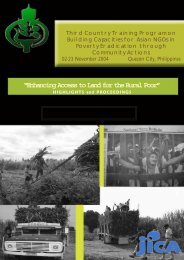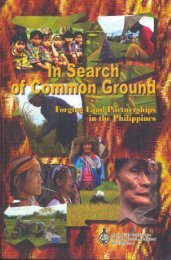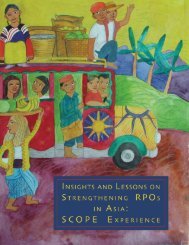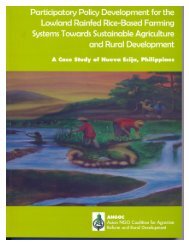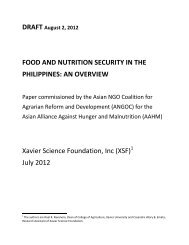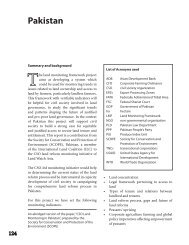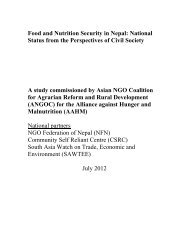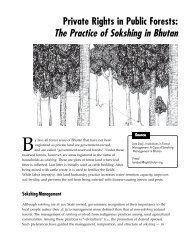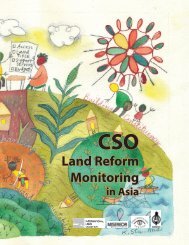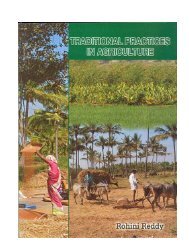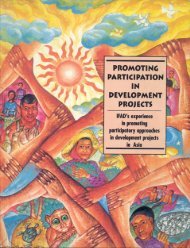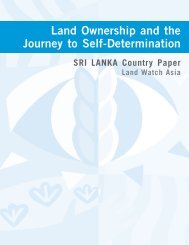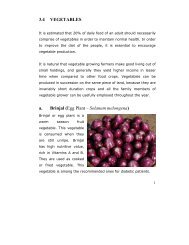Securing the Right to Land FULL - ANGOC
Securing the Right to Land FULL - ANGOC
Securing the Right to Land FULL - ANGOC
You also want an ePaper? Increase the reach of your titles
YUMPU automatically turns print PDFs into web optimized ePapers that Google loves.
char lands cover about 170,000 hectares. Ideally, char households<br />
should get an average of 1.88 hectares each. However, as<br />
much as 60% of char households are absolutely landless.<br />
Fisherfolk<br />
Over 13.2 million people in Bangladesh (10% of <strong>the</strong> population<br />
numbering 130 million) are employed in <strong>the</strong> fisheries sec<strong>to</strong>r—<br />
1.2 million are employed directly, full-time; and 12 million work<br />
only part-time or on a seasonal basis.<br />
Counting family members, an estimated 38 million people<br />
(about 30% of <strong>the</strong> population) are involved in fishery activities.<br />
Many fisherfolk communities have limited access <strong>to</strong> water bodies.<br />
The Ministry of <strong>Land</strong> in each district auctions off lease<br />
rights (lasting 1 <strong>to</strong> 3 years) <strong>to</strong> water bodies. But while<br />
fishermen’s cooperatives are supposed <strong>to</strong> be prioritized in such<br />
auctions, elite groups generally win <strong>the</strong> bidding, through a cooperative<br />
fronting for <strong>the</strong>m. The fisherfolk <strong>the</strong>refore end up<br />
paying rent <strong>to</strong> <strong>the</strong> leaseholder, while <strong>the</strong> latter racks up profits<br />
of up <strong>to</strong> 1000% of <strong>the</strong> auction price.<br />
Poor fisherfolk are likewise unable <strong>to</strong> obtain lease rights <strong>to</strong> khas<br />
water bodies. Of <strong>the</strong> <strong>to</strong>tal 332,142 hectares of khas water bodies<br />
in <strong>the</strong> country, only 5% has been leased out <strong>to</strong> <strong>the</strong> poor<br />
under <strong>the</strong> Khas <strong>Land</strong> Distribution Program. A program for singleyear<br />
leasing of open water bodies has also failed <strong>to</strong> benefit <strong>the</strong><br />
poor. The annual lease amount is Tk.100,000 (or US$1497, in<br />
2008 prices), and this increases by 10% every year. Also, by <strong>the</strong><br />
time <strong>the</strong> lease expires, <strong>the</strong> leaseholder usually will have exhausted<br />
<strong>the</strong> resource.<br />
Ac<strong>to</strong>rs Facilitating or Impeding<br />
Access <strong>to</strong> <strong>Land</strong> and Tenurial<br />
Security<br />
Government<br />
Ministry of <strong>Land</strong><br />
The Ministry of <strong>Land</strong> has overall responsibility for <strong>the</strong> management<br />
and administration of land, collection of <strong>Land</strong> Development<br />
Taxes (LDTs), maintenance of land records, formulation of<br />
policies on land management, land use planning, land reform<br />
implementation, and various development programs related <strong>to</strong><br />
land. <strong>Land</strong> management functions at <strong>the</strong> field level are carried<br />
out by <strong>the</strong> commissioner and deputy commissioner at <strong>the</strong> dis-<br />
THE BACKPEDALLING STOPS<br />
51<br />
trict level, <strong>the</strong> sub-district executive officer, <strong>the</strong> assistant commissioner<br />
(for land) at <strong>the</strong> sub-district level, and <strong>the</strong> assistant<br />
land officer at <strong>the</strong> union level.<br />
Under <strong>the</strong> Ministry of <strong>Land</strong> are several offices that deal with<br />
land access concerns. The <strong>Land</strong> Reform Board operates at <strong>the</strong><br />
upazila land offices and <strong>the</strong> union tehsil offices. It administers<br />
khas land and manages abandoned and vested property; updates<br />
maps and land records between surveys; sets and collects<br />
<strong>the</strong> LDT; and is responsible for <strong>the</strong> implementation of land reform<br />
laws and tenants’ rights.<br />
The <strong>Land</strong> Appeal Board is <strong>the</strong> highest revenue court in <strong>the</strong><br />
country. It serves as final arbiter in matters relating <strong>to</strong> khas<br />
land, changes in records, plot demarcation, and taxation, which<br />
cannot be resolved at lower levels; and rules on appeals of decisions<br />
of District Commissioners.<br />
The Direc<strong>to</strong>rate of <strong>Land</strong> Records and Surveys carries out cadastral<br />
surveys, from which it produces maps showing individual<br />
plots of land and khatian, which is used <strong>to</strong> prepare and maintain<br />
<strong>the</strong> record of rights (ROR) concerning every parcel of land<br />
in Bangladesh.<br />
Ministry of Law, Justice and Parliamentary Affairs<br />
Under <strong>the</strong> Ministry of Law, Justice and Parliamentary Affairs is<br />
<strong>the</strong> Office of <strong>the</strong> Inspec<strong>to</strong>r General of Registration, which registers<br />
ownership arising from <strong>the</strong> sale and o<strong>the</strong>r forms of land<br />
transfer; reports changes <strong>to</strong> <strong>the</strong> Ministry of <strong>Land</strong>; and collects<br />
<strong>the</strong> Immovable Property Transfer Tax.<br />
Non-Government Organizations<br />
There are around 200 NGOs working <strong>to</strong> promote <strong>the</strong> land rights<br />
of landless people in <strong>the</strong> country. The Association for <strong>Land</strong> Reform<br />
and Development (ALRD), a national civil society network,<br />
is an offshoot of <strong>the</strong> NGO Coordination Council for <strong>Land</strong> Reform<br />
Program (NCCLRP). The Council was formed in 1987 <strong>to</strong> support<br />
<strong>the</strong> Government khas land distribution program by raising<br />
people’s awareness of government regulations, policies and<br />
guidelines and by ensuring NGO participation in <strong>the</strong> khas land<br />
distribution program. ALRD has 260 local and national NGO<br />
partners, which mobilize <strong>the</strong> principal ac<strong>to</strong>rs of agrarian reform,<br />
namely, policy makers, public representatives, politicians, and<br />
<strong>the</strong> media, <strong>to</strong> initiate positive pro-poor policy formulation and<br />
effective implementation initiatives. The ALRD is credited with<br />
<strong>the</strong> formulation of <strong>the</strong> National Khas <strong>Land</strong> Management and<br />
ASIAN NGO COALITION FOR AGRARIAN REFORM AND RURAL DEVELOPMENT



